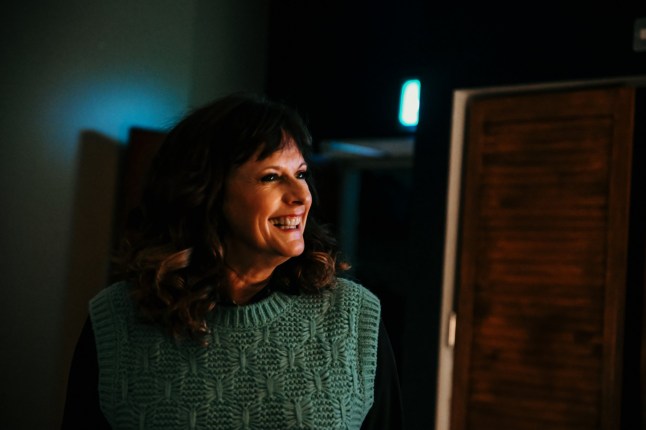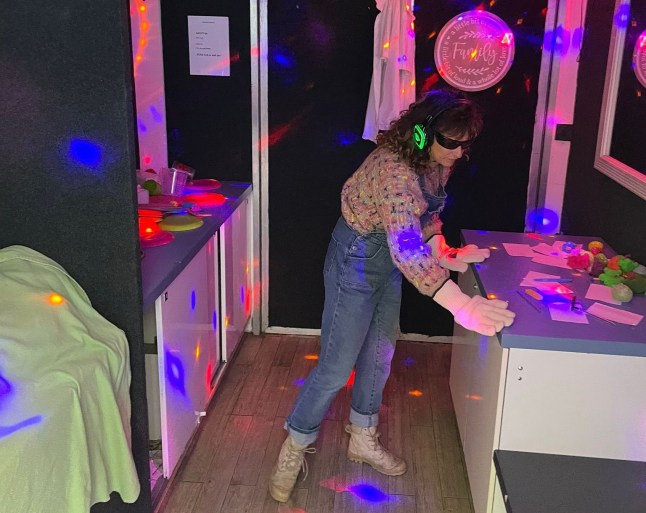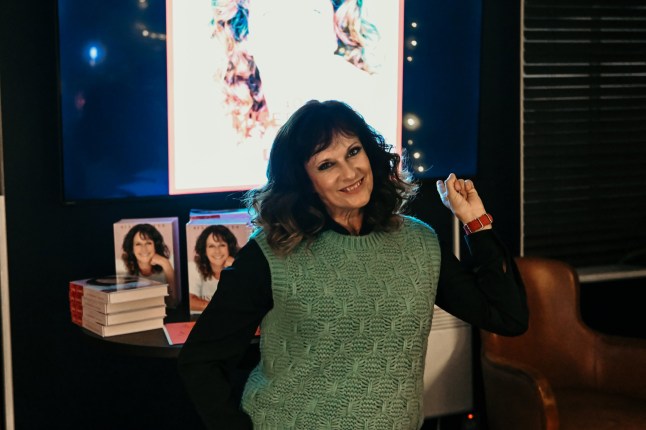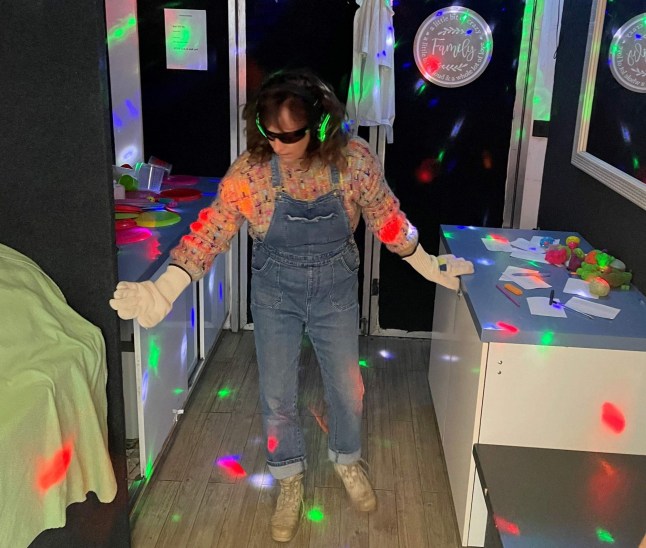
Sian was left with a whole new understanding of how dementia can make you feel (Picture: @kelliannephotographer)
Fumbling with the buttons on my shirt, then with a pen as I attempted to write a simple shopping list, I felt useless and frightened.
At the same time, there was a painful prickling sensation in my feet and a constant noise in my ears – a kind of buzzing, sizzling sound that made it impossible to concentrate.
In that moment, I knew how it felt to have dementia, and I wanted it to end.
Luckily for me, the experience – a virtual simulation which has been designed to replicate dementia symptoms – only lasted three minutes.
After that, I could leave and things would go back to normal.
But actually, when it was over, things didn’t go completely back to normal.
Because I was left with a whole new understanding of how dementia can make you feel.
The simulator is part of a training exercise organised by Music for Dementia, whose Music Made Easy campaign wants to improve music accessibility for people living with dementia.
It involved fitting me with a range of equipment: massive gloves that made me unable to feel shapes correctly or hold onto things properly, glasses which eliminated my peripheral vision, prickly insoles that simulated foot pain and headphones that created constant noise.

Before doing this exercise, my understanding of dementia was very basic, says Sian (Picture: Sian Reeves)
After using the simulator, I was left with a feeling of horror. I felt lost and lonely. I desperately didn’t want to get dementia.
And I felt so much empathy.
Now, I want more professionals, friends and families to do this training to ensure we give our loved ones living with dementia the best care possible.
Before doing this exercise, my understanding of dementia was very basic. I knew that it could affect speech and memory, and that music can help people with dementia relax.
My aunt has vascular dementia and it’s been heartbreaking to watch someone so sharp and so loved falling apart, while still believing they’re completely with it.

I try to share what I’ve learned about dementia as much as possible (Picture: Amanda Searle)
Within our extended family, her diagnosis seemed sudden, but it had probably been developing for years without us noticing.
She’d had foot pain two years ago that we didn’t manage to address – not realising it was a neurological issue, we had taken her to a physio, who thought it might be plantar fasciitis.
She was also always forgetting names, repeating familiar phrases, and had a few falls, which we dismissed as just being typical of what she was like.
Her diagnostic journey has been incredibly challenging and though many experts are involved, each has different opinions, and we still don’t really have the whole picture.

Treat people with dementia with respect, dignity and kindness (Picture: @kelliannephotographer)
She’s not currently on a treatment plan. Because she doesn’t believe she’s not well, she’s refusing to go on any medication.
It’s exhausting trying to access help for her when she doesn’t want it.
Plus, I can’t help but think that many of her A&E visits for panic attacks and falls could perhaps have been avoided if her condition had been managed with proper medication sooner.
While it’s a tiring battle for my uncle and family, I have to remember it’s probably more terrifying for my aunt.

Dementia is a far tougher and more extreme reality than I’d ever imagined (Picture: Amanda Searle)
I don’t think I ever truly appreciated how scary this condition is until I was offered the chance to try the simulation.
After starting it, I was challenged to complete everyday tasks like writing a shopping list, buttoning a shirt and using my phone.
I began to struggle almost immediately.
With the gloves on, I couldn’t hold a pencil, let alone write.
Buttoning up clothing was impossible and I remember thinking that, if I was fumbling this badly every day, I doubt I would bother eating, washing up or even going into a kitchen.
Alzheimer’s and dementia: the facts
The most common forms of dementia (symptoms of a decline in brain function) are Alzheimer’s disease followed by vascular dementia.
Alzheimer’s is caused when plaques and tangles form in the brain making it increasingly hard for it to function properly. Early symptoms include forgetting recent events, struggling to remember words, becoming disorientated in familiar places and finding it difficult to concentrate.
Common early symptoms of vascular dementia include problems making decisions or following a series of steps, such as cooking a meal; slower speed of thought and trouble sleeping. The condition can also cause significant mood changes and depression and make people behave completely out of character.
Dementia is the UK’s biggest killer – and one in three babies born today will develop dementia in their lifetime. The risk of developing both Alzheimer’s and vascular dementia roughly doubles every five years from the age of 65. Women and men are affected equally. Diabetes, obesity, heart problems and high blood pressure all increase the risk.
However, you can significantly reduce your chances of developing the diseases by leading a healthy lifestyle – not smoking or drinking to excess, eating a balanced diet and getting regular exercise. Keeping mentally and socially active is also beneficial.
The third most common form of dementia – accounting for an estimated 20 per cent of cases – is Lewy body. With this condition, tiny clumps of protein appear in the brain’s nerve cells, causing a range of issues including mood swings, problems processing thoughts, hallucinations, difficulty balancing and walking slowly. Although DLB (dementia with Lewy body) can affect people under 65, it is much more common as we age, affecting men and women equally.
There is currently no cure for any of the forms of dementia. But getting an early diagnosis is very important in allowing you and your loved ones to access all the medical and social support available. If you are worried that you have any of the symptoms, your GP will be able to refer you to a specialist who can carry out a range of tests.
If you are worried that yours or someone else’s symptoms may be dementia, download the Alzheimer’s Society symptoms checklist, on alzheimers.org.uk; for more information or support on anything you’ve read here, call our support line on 0333 150 3456 or visit our website.
Meanwhile, the restricted vision meant I couldn’t see things coming from the side.
That’s why, when one of the training instructors approached me, I jumped, as he seemed to come from nowhere.
He then tried to spoon-feed me. It was so disconcerting and invasive, I desperately tried to bat him away.
Suddenly I understood how vulnerable my aunt must feel.
I had always considered myself empathetic and caring and thought I was behaving appropriately with my aunt, but now I know better.

After using the simulator, I was left with a feeling of horror (Picture: Sian Reeves)
Of course, I was aware dementia caused confusion.
I didn’t know about losing fine motor skills, being unable to dress yourself, having to rely on others to feed and clothe you, and take you to the toilet and all while experiencing restrictive eyesight, foot pain, hand numbness and continuous noise.
It’s a far tougher and more extreme reality than I’d ever imagined.
Now, when I’m with my aunt, I’m more considered in the way I act around her.

I’d like to see more people being given the chance to experience this particular simulation, says Sian (Picture: Sian Reeves)
I listen without confusing her with quick conversation, and I repeat calming information she wants to know, even if i’ve already said it.
I also make sure conversation isn’t too wide or varied, and I offer to get everything for her, which brings her relief when she’s forgotten where things are.
These are all things I would never have known to do, were it not for the simulation.
Around one million professionals working in the NHS, adult social care and emergency services have received dementia awareness training, but I’d like to see more people being given the chance to experience this particular simulation.
In fact, I think we need to educate everyone about caring, tolerance and potential limitations so they can manage situations with older family members better.
I’d also like to see mandatory training for carers about how to support people living with dementia.
For my part, I try to share what I’ve learned as much as possible.
Because even though my experience only lasted three minutes, it’s helped me make changes that will last a lifetime – and they are simple changes we can all make.
Approach people with dementia head on, not from the side.
Offer to help if they’re struggling with something fiddly.
Always explain what you’re doing and do it slowly. And treat people with respect, dignity and kindness – because remember, one day, it could be you.
Do you have a story you’d like to share? Get in touch by emailing Ross.Mccafferty@metro.co.uk.
Share your views in the comments below.
Arrow
MORE: When my date’s mum started grinding on him, I legged it
Arrow
MORE: Doctors said my baby was ‘perfect’ — now life is at a standstill
Arrow
MORE: I felt so insecure – then I got my diagnosis
Comments
Add Metro as a Preferred Source on Google
Add as preferred source
Degrees of Separation
Join us each week as hear from the people going through familial estrangement, for worse and for better.
